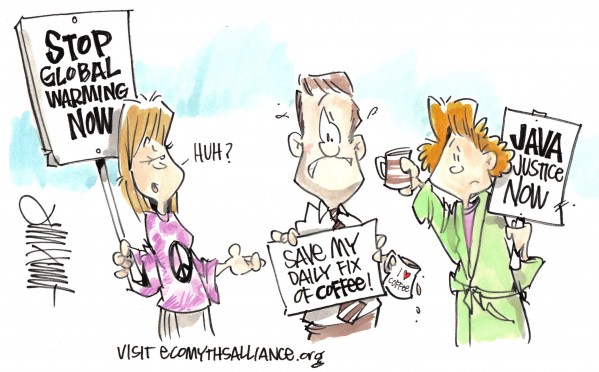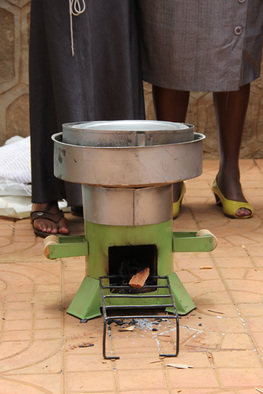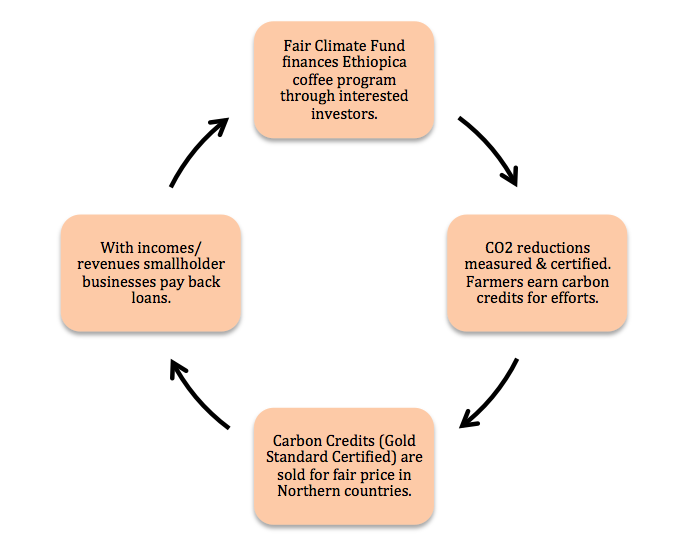|
Some facts about coffee:
FairTrade Carbon Neutral Coffee ProjectTo address the impending coffee shortages, the FairClimateFund, ICCO, Max Hevelaar Foundation, and Ethiopian FairTrade Coffee OCFCU organization are teaming up to ensure the entire coffee supply chain (from producer to consumer) contributes to solutions. Through this partnership, this project aims to increase the resilience of coffee farmers, protect coffee forests, introduce fair trade carbon neutral coffee in Europe, and use revenues generated through carbon credits to ensure project sustainability. To do this these partner organizations will support 30,000 coffee farmers and their families in addressing deforestation while implementing mitigation and adaptation strategies to decrease the effects of climate change. The FairCliamteFund is first investing in the implementation of low-emission, low-energy cook stoves in Ethiopian homes. This will not only work to improve the health of women and children who have lung and irritation issues from wood-stove smoke, but also significantly reduce carbon emissions from traditional inefficient wood-fire stoves. Furthermore, it will allow women more free time to increase their productivity regarding the farming and production of coffee beans which are the source of their livelihood. Next, the project will quantify (measure) CO2 reductions and certify them through the Gold Standard Foundation, earning the farmers carbon credits in the European Union Emission Trading System (EU EST). These credits will be sold to Northern countries who are buying the FairTrade carbon neutral coffee, and the revenues from these streams will be used to pay back loans and re-invest in the sustainability of the program. For example, funds will be used for reforestation efforts that further reduce carbon emission, and help to shade the coffee forests, leading to increased stability and sustainability of these farms. The table below outlines the cycle of investment proposed by the FairTrade Carbon Partnership in Coffee. This new model for investment not only ensures emission reduction at the level of production, but also requires buyers (such a supermarkets, restaurants, businesses, and retailers) to reduce their own emissions. Buyers can do this through new coffee brewing processes, waste removal improvements, and efficient transportation methods, which are responsible for much of the emissions of CO2 that occur throughout the supply chain.
The FairTrade Carbon Partnership in Coffee is a pilot project that ensures producers are not the only ones carrying the burden of climate change, and provides an investment venture with increased security and predictability, providing a safety net for investment. These types of projects facilitate changes in the behavior of private finance in favor of positive mitigation and adaptation efforts regarding climate change. Collaboration to ensure carbon emission reduction as well as stable and sustainable development create lower-risk investment structures that lead to successful FairTrade carbon neutral ventures. That, and happy, caffeinated, non-homicidal consumers.
2 Comments
Gram
6/12/2014 04:45:41 am
I paused this morning while si;pping my coffee and tried to imagine my day with out it.
Reply
Trish
6/12/2014 09:15:21 am
I never imagined coffee as a social justice issue - totally enlightened!
Reply
Leave a Reply. |
Categories
All
Archives
March 2024
|



 RSS Feed
RSS Feed
